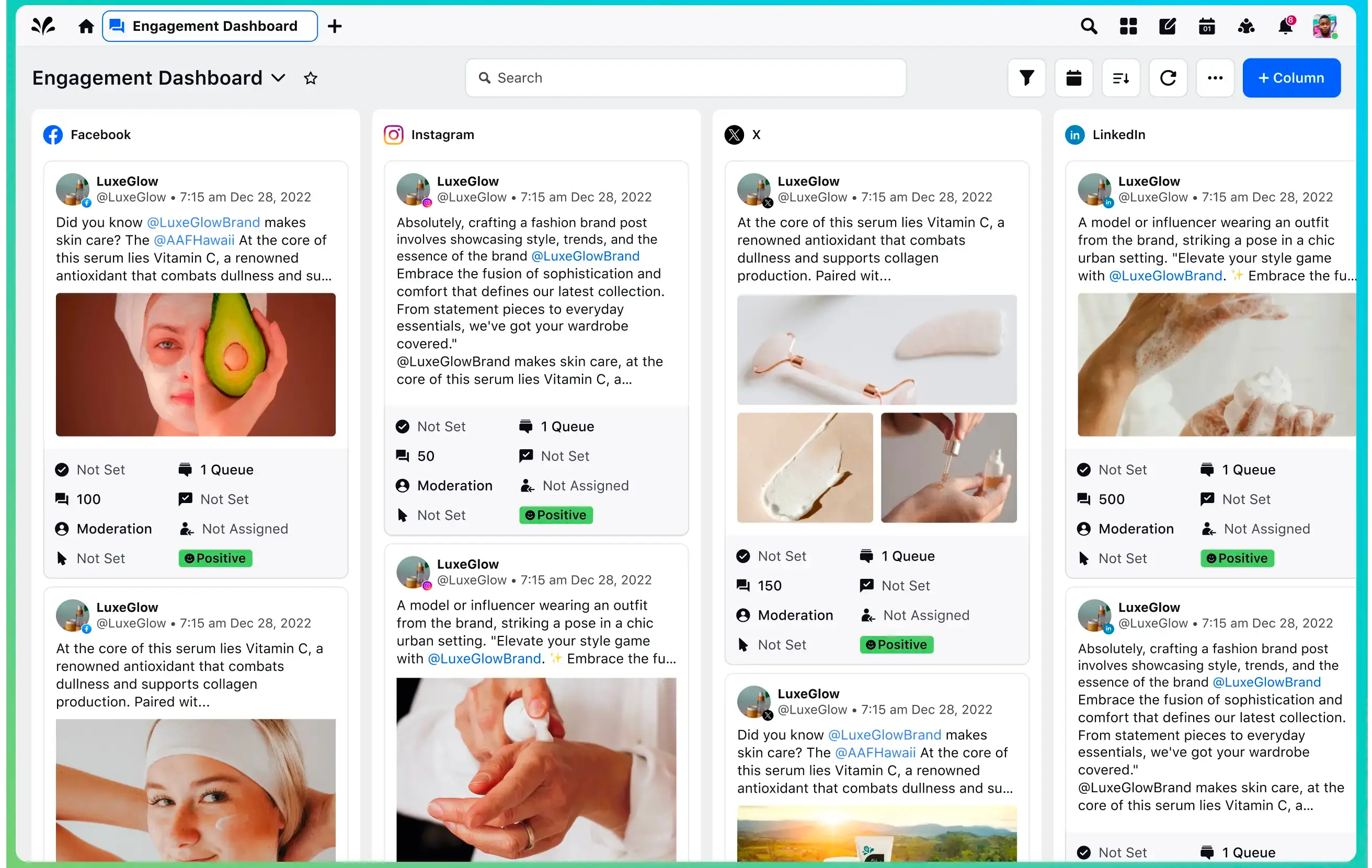The undisputed leader in social media management
For over a decade, the world’s largest enterprises have trusted Sprinklr Social for its in-depth listening, unmatched channel coverage, enterprise-grade configurability and industry-defining AI.

Social media measurement: How to get accurate insights
Are you hoping to get better at social media measurement, so you know who or what to attribute your social media success to?
A recent survey found that 48% of B2B marketers are struggling to measure the performance of their marketing content across multiple platforms.
Despite having sophisticated tools and data, most companies struggle to accurately measure the effectiveness of their social media campaigns. And tracking social media metrics alone will not do the job. You must have access to the right data to get the most telling insights.
In this article, we’ll shed light on the specifics of social media measurement to help you accurately measure and analyze your social media campaigns and optimize results.
What is social media measurement?
Social media measurement is the process of closely analyzing and evaluating the results of your social media activities. It helps you understand the impact of your social media efforts, i.e., you can identify how well your content clicks with your target audience.
Imagine that you're a social media manager at a multinational company. Your job entails making important decisions concerning your brand’s social media strategy every day. At the end of the month, how will you determine if all those tweets and Instagram posts made a difference?
Think of social media measurement as your trusty compass, expertly guiding you through the vast landscape of the digital world. Just like a private detective, it reveals the inside scoop on your audience's preferences at regular intervals, helping you stay one step ahead of your competitors.
Objectives of social media measurement
Analyzing social media data should be an important part of your overall business strategy. It helps you understand how to effectively reach your target audience and improve your brand presence, among other things.
Establish brand awareness
- Track how effective your campaigns are in increasing brand awareness
- Keep tabs on the engagement, reach of your content and the consumer sentiment around your offerings to help you determine how well your brand is being perceived
Engagement tracking
- Monitor engagement with your content across all channels
- Identify what content resonates with your target audience and increases customer engagement
Audience Insights
- Know your target audience better by scanning your social media channels
- Gauge your audience’s preferences and interests and tailor your marketing efforts accordingly
Performance Analysis
- Obtain valuable insights into how well your campaigns are performing
- Adjust and refine your campaigns to get the maximum return on your investments
Learn More: How to set social media goals for your business
4 steps to implementing social media measurement in your business
Monitoring and measuring social media performance is essential for any business. But it’s crucial to have access to pertinent data to accurately gauge your social media progress.
Here’s a step-by-step guide to making social media measurement an integral part of your social media strategy.
Step 1: Choosing the right metrics
Identifying the metrics that align with your business objectives is a critical part of social media measurement. Some common metrics include:
- Reach: The number of people who see your content
- Engagement: The level of interaction (likes, comments, shares) your content receives
- Conversion: The number of users who take a desired action (purchases, sign-ups) after engaging with your social media content
- Brand sentiment: The public perception of your brand on social media
Deep Dive: Social media ROI: How to measure and improve your ROI
Step 2: Using relevant tools and techniques
You'll need the right social media management tools and techniques to effectively measure your social media efforts. Here are a few popular ones:
- Social media analytics platform: Using analytics tools, you can get comprehensive data on your social media performance
- URL tracking: Embedding unique URLs in your social media posts lets you track the traffic and conversions generated from each platform
- Hashtag monitoring: Monitoring relevant hashtags helps you understand the reach and engagement of your social media campaigns
Relevant Read: Social media Reach vs. Impressions: What's the difference?
Step 3: Analyzing data and drawing insights
Once you have gathered the data, it's time to analyze it and draw meaningful insights. Here's how it’s done:
- Compare performance: Look for patterns and trends by comparing your social media metrics over time or against your competitors
- Identify top-performing content: Determine what types of content resonate the most with your audience and try to replicate that success
- Uncover audience demographics: Analyze the demographic data of your social media followers to better understand your target audience
Step 4: Reporting and communicating social media measurement findings
To make the most out of your social media campaign efforts, it's important to effectively report and communicate your findings. Here's how to do it:
- Visualize data: Present your findings in visually appealing formats such as charts, graphs and infographics for easy comprehension
- Provide actionable recommendations: Based on your insights, offer actionable advice to improve your social media strategy
- Regular reporting: Establish a schedule to inform stakeholders of your social media performance
Best practices and challenges of social media measurement
By implementing best practices for analyzing your social media performance, you'll gain a distinct advantage in effectively addressing challenges and tracking your social media efforts.
Best Practices
- Establishing clear goals and objectives for your social media campaigns is crucial. Whether you're aiming to increase brand awareness, drive website traffic or generate leads, having specific goals will guide your measurement strategy.
- Track your social media metrics using an analytics tool, such as conversation analytics, which offers a comprehensive analysis of social media data.
- Regular monitoring and analysis of your social media metrics are essential. Monitor engagement rates, click-through rates and conversion rates as key performance indicators (KPIs). By consistently evaluating these metrics, you can identify what's working and what needs improvement.
Also Read: 8 best practices to ace your social media marketing
Challenges
- One common challenge is measuring the ROI of social media activities. A complex customer journey with multiple touchpoints can make it difficult to accurately attribute conversions and sales solely to your social media efforts.
For example, consider a scenario where a customer initiates their journey in-store. However, they later discover your Facebook page and proceed to make a purchase online. Therefore, determining the origin of the sale becomes crucial. But can you accurately identify where the sale originated from in this case? - Another challenge arises from the immense amount of data available online. Social media platforms generate an overwhelming amount of information. It can be challenging to sift through and extract meaningful insights from all that data. To overcome this challenge, consider using data visualization tools to present your findings in a more digestible format.
- Finally, keeping track when dealing with multiple social media accounts and platforms can be overwhelming. Using a social media management tool, such as Sprinklr, allows you to publish content and analyze data across platforms seamlessly.
Learn More: 6 common social media publishing challenges (and how to overcome them)
Future trends in social media measurement
In the future, social media measurement will be informed by cutting-edge technologies that will revolutionize how you analyze and interpret data. AI-powered algorithms can track and analyze social media trends, sentiment and engagement levels effortlessly, empowering you to make data-driven decisions and optimize your social media strategies.
Moreover, sentiment analysis will set the future benchmark for social media analytics. This will be possible through advancements in natural language processing (NLP) and machine learning (ML). The data analysis will be much more accurate and will allow brands to get a nuanced understanding of customer preferences and feedback.
Dive Deeper: 3 New Ways Artificial Intelligence Is Powering The Future Of Marketing
Final thoughts
In conclusion, factual accuracy is key when measuring your social media performance.
Don't rely on assumptions or guesswork. Instead, get the right tool and use proper techniques to gather precise data. This will help you increase your engagement and reach and maximize your return on investment.
A social media analytics tool will help you unlock the full potential of your social media efforts and secure your business goals.
Ready to level up your social media measurement game? Connect with us for a demo of Sprinklr Insights, the only tool you will ever need for measuring the impact of your social media activities.
Frequently Asked Questions
To identify the success of any post, it is imperative to track and measure its performance. You should find its reach, engagement and sentiment on all relevant platforms. You must conduct market research, monitor competitor activities and experiment with different platforms to identify the channels that yield the best results. Choosing a social media channel also depends on your target customer base and the platforms that they are active in.
You must define a clear objective for your social media campaigns before tracking the ROI. You should establish key performance indicators (KPIs) that adapt to your business goals. By tracking lead generation, conversions and customer acquisition costs, you can measure the financial impact of your social media efforts.
Focusing solely on vanity metrics such as likes or followers is one of the most common mistakes made by brands. Instead, you should look at setting clear goals to help you optimize your social media efforts for better results. And don't forget to track conversions since they indicate the real impact of your campaigns.
You should keep track of and measure the performance of your social media channels regularly. Tracking your social media performance once a week is considered best practice. However, the frequency of analysis may vary depending on your business objectives and available resources.
